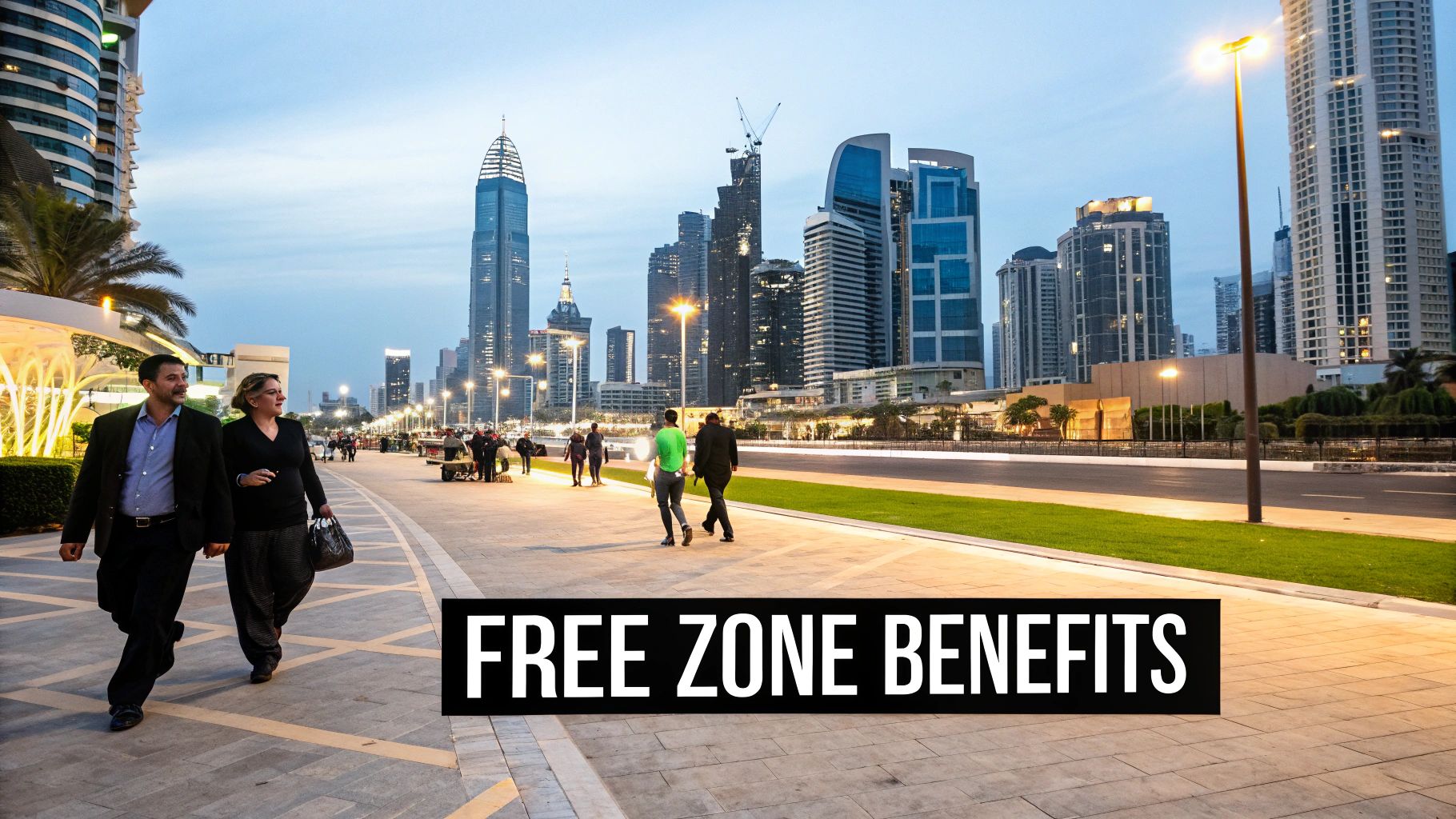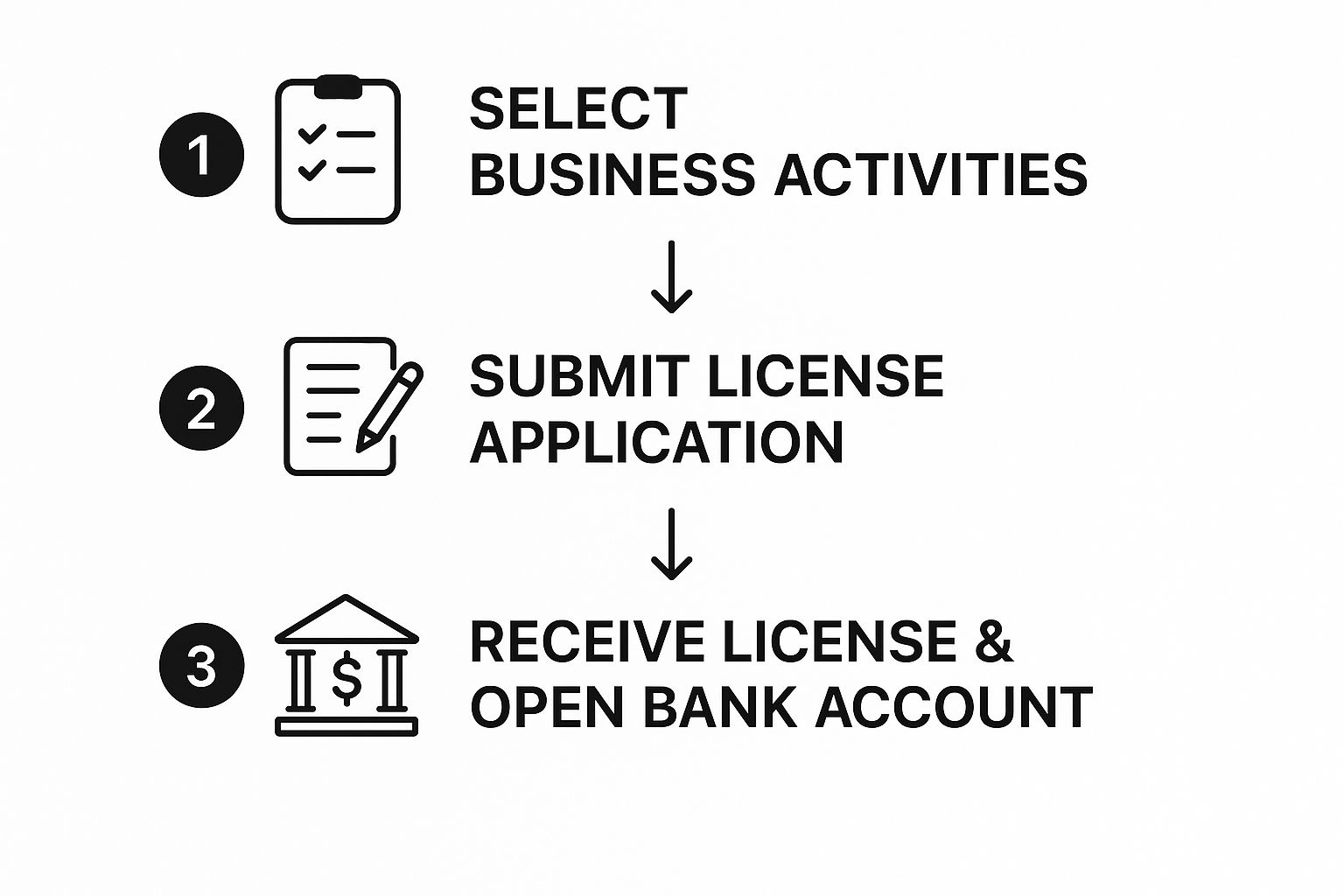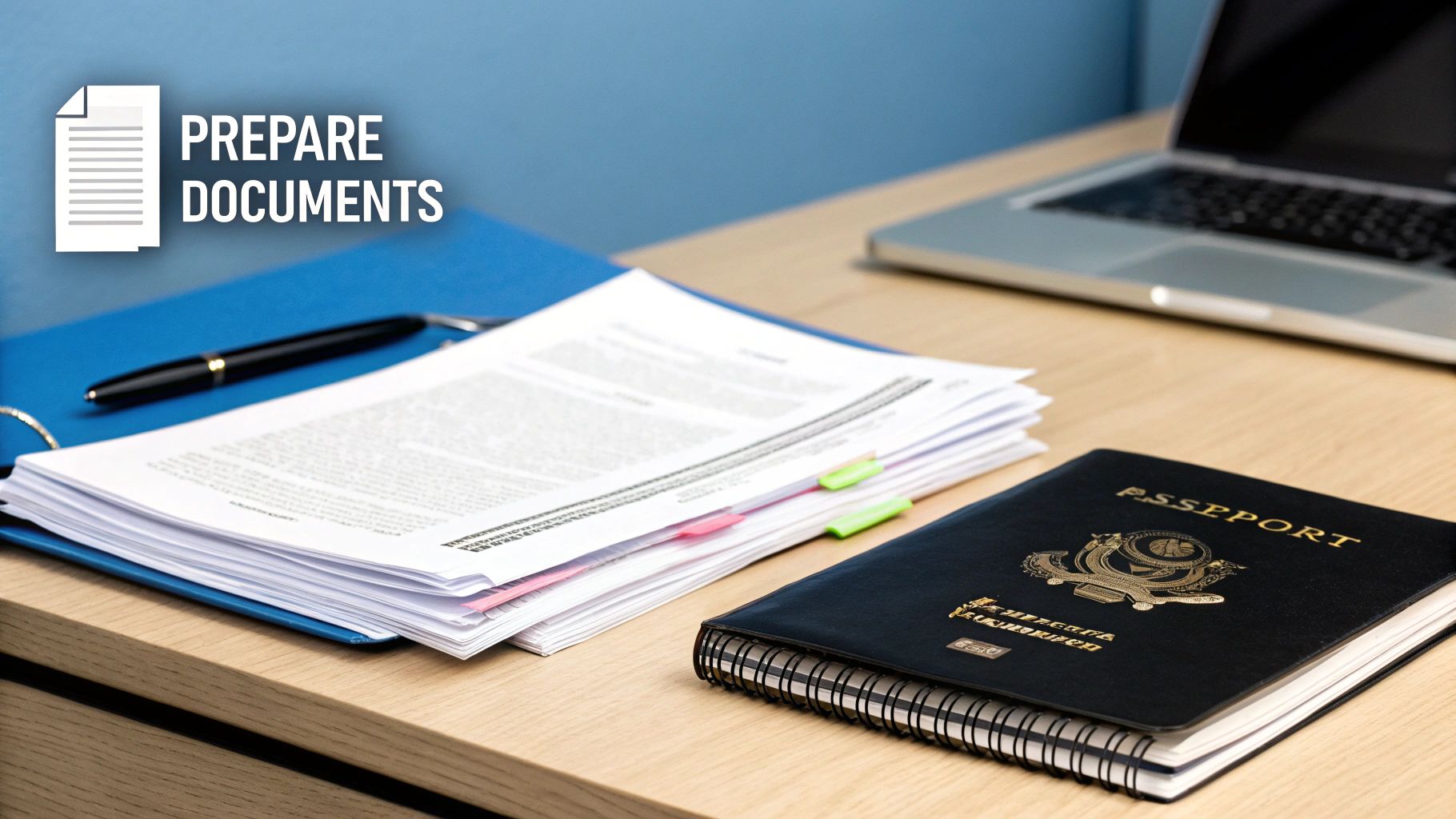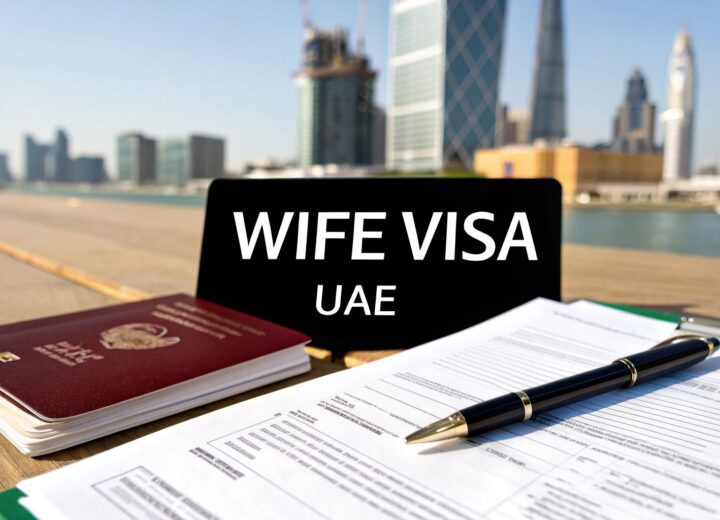For any international entrepreneur looking to set up shop in the UAE, a free zone company setup in Dubai is usually the quickest and most effective way to get started. This structure is a game-changer because it lets you keep 100% control and ownership of your business—a massive plus compared to other setups. It’s a popular route for everyone from scrappy startups and SMEs to global giants wanting a solid base in the Middle East.
Why a Dubai Free Zone Is Your Smartest Business Move
When entrepreneurs start exploring a UAE expansion, the conversation almost always lands on free zones. But what’s all the buzz about? It’s not just about the tax benefits. A Dubai free zone offers a powerful combination of independence, strategic location, and a supportive framework built for international success.
The biggest draw, hands down, is 100% foreign ownership. In the past, a mainland company required a local partner, which meant giving up a slice of your company. A free zone setup cuts through all that, giving you total and undisputed control over your operations, your money, and your future. For founders, that kind of autonomy is priceless.
The Power of Industry-Specific Ecosystems
Think of Dubai's free zones not as generic business parks, but as highly specialized hubs designed for specific industries. This smart clustering creates powerful ecosystems where businesses in the same field can feed off each other's energy and thrive.
Picture a tech startup launching in Dubai Internet City, rubbing shoulders with giants like Microsoft and Oracle. Or an e-commerce brand setting up in Dubai CommerCity, with logistics and payment gateways practically built-in.
This focused approach delivers some serious advantages:
- Networking Opportunities: You're surrounded by peers, potential clients, and even competitors. This creates amazing opportunities for partnerships and collaborations that just wouldn't happen otherwise.
- Access to Talent: These specialized zones are magnets for skilled professionals in that industry, making it much easier to find and hire the right people.
- Tailored Infrastructure: A media company in Dubai Media City gets access to state-of-the-art production studios, while a logistics firm in Jebel Ali Free Zone (JAFZA) is right next to one of the world's busiest seaports.
This clustering effect isn't an accident; it's a core part of Dubai’s economic strategy. By creating these micro-economies, the free zones spark innovation and help new companies hit the ground running and scale up fast.
If you’re trying to decide which free zone is the best fit, a quick look at this table can help clarify the main benefits.
Key Free Zone Benefits at a Glance
| Benefit | What It Means for Your Business |
|---|---|
| 100% Foreign Ownership | You maintain complete control over your company's assets and decisions. |
| 0% Corporate & Personal Tax | Keep more of your profits without worrying about income tax. |
| Full Repatriation of Profits | You can send 100% of your capital and profits back to your home country. |
| Industry-Specific Hubs | Access tailored infrastructure and a community of peers in your field. |
| Streamlined Setup | Faster and simpler incorporation processes compared to other structures. |
| Access to Global Markets | Strategic location connecting Europe, Asia, and Africa. |
These core advantages are what make the free zone model so appealing to entrepreneurs from around the globe.
A Foundation for Economic Growth
You can’t overstate the impact free zones have had on Dubai's economy. Since JAFZA kicked things off back in 1985, these zones have been powerful magnets for foreign direct investment (FDI), thanks to perks like 0% corporate tax and exemptions on customs duties.
Today, there are over 44 free zones, and they are the bedrock of Dubai's diversified economy. Companies based in free zones now make up over 30% of all registered businesses and contribute around 40% of Dubai's total GDP. That tells you just how vital they are.
More Than Just a License
At the end of the day, setting up in a free zone is about more than just getting a trade license. It's about plugging into a dynamic business community. These zones offer cost-effective solutions for everyone, from solopreneurs needing a flexi-desk to large industrial firms that require massive warehouses.
You also get the benefit of simplified administrative support. With experienced Corporate PRO Services on hand, everything from getting your documents attested to processing visas is handled for you, letting you focus on what really matters—growing your business. This kind of support is invaluable, especially if you're new to the region.
For a wider perspective on setting up, our complete guide on how to start a business in the UAE gives you the full picture. It’s this combination of a supportive system and major financial perks that makes a Dubai free zone a truly smart move for any international entrepreneur.
Choosing the Right Free Zone for Your Venture

With over 40 free zones in Dubai, I get it—the sheer number of options can feel overwhelming. But this is one of the most critical decisions you'll make when setting up your company. It’s not about finding just any good free zone; it's about finding the right one for your specific venture.
This choice goes way beyond just comparing annual license fees. Picking the right free zone directly impacts your costs, your day-to-day operations, and even your potential for growth down the line. A mismatch can lead to operational headaches and unexpected expenses you really don't need.
Aligning Your Industry with a Specialized Zone
Dubai's free zones aren't built as one-size-fits-all solutions. Think of them as purpose-built ecosystems. A media production house would feel completely out of place in a logistics-focused zone, and the same goes for a trading company setting up in a creative hub. The first, and most important, step is to match your industry to a zone that speaks its language.
Let's look at a few real-world scenarios I see all the time:
- For an e-commerce business: A free zone like Dubai CommerCity is a no-brainer. It was specifically designed for digital commerce, offering integrated logistics, fulfillment centers, and tech support that online retailers need to thrive.
- For a media or marketing agency: Dubai Media City or Dubai Production City is where you want to be. You'll get immediate access to a network of creatives, state-of-the-art studios, and industry events, creating an environment that’s perfect for collaboration.
- For a healthcare or wellness clinic: Dubai Healthcare City (DHCC) is the premier choice. It operates under its own regulatory body, which ensures you’re compliant with international healthcare standards and connects you with a community of top medical professionals.
This kind of strategic alignment means you're not just getting a license; you're joining a community with shared goals, challenges, and opportunities.
Evaluating the Key Decision Factors
Once you've shortlisted a few zones based on your industry, it's time to dig deeper. Every business has unique priorities, whether that's a tight budget, a strategic location, or the need for specific types of facilities.
Here are the crucial factors you need to assess:
- Permitted Business Activities: Does the free zone’s list of approved activities cover everything your business does now and plans to do in the future? A mismatch here can lead to fines or, worse, a complete stop to your operations.
- Location and Logistics: If you're in trading or import/export, a zone like Jebel Ali Free Zone (JAFZA) with its direct port access is invaluable. For a consulting firm that relies on international clients, a location near Dubai International Airport (DXB) might be more strategic.
- Overall Cost: Look beyond the initial license fee. You need to compare the costs of visas, office space (from a simple flexi-desk to a dedicated office), and, of course, the annual renewal fees. Some zones, like IFZA, have become known for their cost-effective setup packages, making them a hit with startups.
- Scalability: Can the free zone grow with you? Check how easy it is to upgrade your license, add more visas, or move into a larger office space as your team expands. You don’t want to be forced to relocate just as your business starts taking off.
My best advice? Create a checklist of your non-negotiables. Rank these factors by how important they are to your business model. This simple framework will turn a confusing choice into a clear, logical decision.
Comparing Top Dubai Free Zones for Common Business Needs
To make this decision a bit more tangible, let's compare a few of the most popular options. This table gives you a snapshot of how different zones cater to very distinct business needs, helping you see where you might fit in.
| Free Zone Name | Best For (Industry) | Key Feature | Typical Cost |
|---|---|---|---|
| IFZA (International Free Zone Authority) | Startups, Consultants, General Trading | Highly cost-effective packages and flexible visa options. | Low to Medium |
| DMCC (Dubai Multi Commodities Centre) | Commodities Trading, Professional Services | Prestigious address and a vast business networking community. | High |
| JAFZA (Jebel Ali Free Zone) | Logistics, Manufacturing, Trading | Direct access to Jebel Ali Port and a global logistics network. | Medium to High |
| Dubai CommerCity | E-commerce, Digital Retail | Turnkey solutions including fulfilment, warehousing, and marketing. | Medium to High |
Ultimately, choosing the right free zone is a foundational step that sets the tone for your entire business journey in the UAE. By carefully analyzing your industry, budget, and logistical needs, you can select a home that not only supports your launch but also fuels your long-term growth.
To simplify this critical decision, you can get a more detailed breakdown with our guide on Freezone Business Setup.
Navigating the Company Registration and Licensing Process
So, you’ve picked out the perfect free zone. What’s next? Now comes the administrative part: getting your company officially registered and licensed. This might sound like a mountain of paperwork, and while there's definitely a process, it's more straightforward than you might think if you tackle it step-by-step.
The first real move is to lock in your company’s trade name. This isn't just about picking something catchy; the name has to be unique and follow the UAE’s official naming rules. Once that’s sorted, you'll submit an application for initial approval from your chosen free zone authority. Think of this as the official green light to move forward with everything else.
Preparing Your Core Documentation
With that initial approval in your pocket, your focus shifts to gathering all the necessary documents. Let me be clear: accuracy here is everything. A single mistake or omission can throw a wrench in the works and cause serious delays. You're building the legal foundation of your company, so every piece of paper counts.
Generally, you'll need to pull together the following:
- A Detailed Business Plan: This needs to clearly lay out your business goals, how you plan to operate, and your financial forecasts.
- Passport Copies: Make sure you have clear, valid copies for every shareholder and manager involved.
- Application Forms: Each free zone has its own specific forms. Fill them out carefully and completely.
- Memorandum and Articles of Association (MOA/AOA): These are the formal documents that define your company's legal structure. They need to be drafted correctly and notarized.
Here's a tip based on years of experience: pay very close attention to document attestation. Any documents coming from outside the UAE often need to be attested by the UAE Embassy in your home country and the Ministry of Foreign Affairs here in the UAE. This is a common bottleneck that trips people up. As Specialists in Corporate PRO Services and Attestation Services, we know that handling this proactively can save you weeks of waiting.
This simple flowchart breaks down the key stages, from your first application to getting your business up and running.

As you can see, once you’ve done the initial groundwork, getting your license and opening your doors is a pretty linear process.
Understanding Different License Types
Picking the right license is fundamental to your free zone company setup in Dubai. It legally defines exactly what your business can and can’t do. Getting this wrong can lead to fines or major operational headaches down the line.
You’ll typically come across three main license categories:
- Commercial License: This is for any business centered around trading, importing, or exporting goods. For example, if you’re buying electronics in bulk to resell across the region, this is the license you’ll need.
- Professional License: This one is designed for service-based businesses and professionals offering specialized skills. Think marketing agencies, IT consultants, or business advisors.
- Industrial License: If your business involves manufacturing, processing, or even just assembling goods, you’ll need an industrial license. A company importing raw wood to build and sell furniture from within the free zone is a classic example.
A very common mistake I see is entrepreneurs picking a license that’s too restrictive. Always think about your future plans. It’s much smarter to choose a license that gives you room to grow and diversify without having to go through major amendments later on.
Getting through this stage successfully is what really unlocks your new venture's potential. All this careful preparation is what allows you to enjoy UAE tax benefits for international entrepreneurs, turning what seems like a complex legal process into a clear path toward success in the region.
Securing Visas and Handling Post-Setup Essentials

Getting that trade license in your hands is a fantastic feeling, a major milestone. But it's not the finish line. Think of it as the starting gun for the next crucial phase: setting up your actual life and operations in Dubai.
Now, your focus has to shift to the essentials that come after incorporation. Topping that list is securing residency visas for yourself, your partners, and any staff you plan to hire. This is the stage that takes your company from a piece of paper and turns it into a living, breathing, and fully operational venture.
First thing's first: you need an Establishment Card. It’s sometimes called a Company Immigration Card, and it’s non-negotiable. This document officially registers your new company with the immigration authorities, effectively linking your trade license to the government's visa system. You can't apply for a single visa without it.
The Visa Application Journey
With your Establishment Card issued, you can finally kick off the visa process for shareholders, employees, and anyone else who needs residency. The path is pretty well-trodden, and understanding the sequence of events can save you a lot of headaches and manage your expectations.
It almost always unfolds in this order:
- Apply for an Entry Permit: This is a temporary visa that lets the person enter (or stay in) the UAE specifically to complete the rest of their residency application.
- Complete the Medical Fitness Test: This is a mandatory health check. It involves a standard blood test and a chest X-ray to screen for any communicable diseases.
- Undergo Emirates ID Biometrics: The applicant will need to visit a designated center to have their fingerprints and photo taken for their official Emirates ID card.
Once these hurdles are cleared and all the results are in, the final residency visa gets stamped right into the applicant's passport. These visas are typically valid for one to three years, though this can vary depending on the specific free zone and the person's role in the company.
Securing your residency is so much more than a box-ticking exercise. It's the key that unlocks your entire life in the UAE. You need it to rent an apartment, get a driver's license, open personal bank accounts, and set up utilities. It’s what makes you a legal resident.
Visa Quotas and Sponsoring Your Family
One of the first questions we always get is, "How many visas can my company have?" It’s a great question, and the answer is directly tied to the type of facility you’ve leased. If you went with a basic flexi-desk package, you might only get one or two visas. A physical, dedicated office space, however, will give you a much larger visa allocation.
Once your own residency visa is stamped and finalized, you can then begin the process of sponsoring your immediate family, like your spouse and children. This is a separate application where you act as their personal sponsor.
Opening Your Corporate Bank Account
While you’re sorting out visas, you need to be working on opening your corporate bank account. Honestly, this is often the most challenging post-setup task, and it catches a lot of new business owners by surprise. It's not as simple as walking into a bank with your new license.
UAE banks are required to perform very strict due diligence to comply with anti-money laundering (AML) regulations. They need to fully understand who you are, what your business does, where your funds are coming from, and the nature of your expected transactions.
You'll need to be ready to provide:
- A detailed business plan.
- Full profiles of all business partners.
- Information on your typical clients and suppliers.
- Proof of your business address (your lease agreement).
A huge tip here: choose an SME-friendly bank. Some financial institutions are simply more experienced with startups and free zone companies, and their onboarding process can feel a lot smoother.
Looking Ahead: Long-Term Visas and Operations
Beyond the standard residency visa, you might want to explore more permanent solutions like the Golden Visa. This offers long-term residency (often 10 years) for certain investors, entrepreneurs, and highly skilled professionals.
As Specialists in Golden Visa on Property and Investor Visa, we guide many of our clients through these more advanced residency options to give them greater stability. For a complete breakdown, our guide on the investor visa UAE requirements is a great resource.
Finally, as you settle in, other day-to-day operational needs will pop up. For instance, if you’re frequently hosting executives or important clients, arranging for a luxury business chauffeur hire in Dubai can add a layer of professionalism to your operations. Getting these details sorted ensures your launch into the Dubai market is as seamless as possible.
How to Operate Beyond Your Free Zone

One of the biggest myths I hear about a free zone company setup in Dubai is that your business is trapped within its geographical borders. It's a common worry for entrepreneurs who think this will choke off their market reach, but the reality on the ground is much more flexible.
You absolutely can—and should—engage with both the UAE mainland and international markets. It's all about understanding the right channels to do so legally and effectively.
For a long time, if you were dealing in physical goods, this meant you had to partner with a local distributor. This mainland-licensed company would be your agent on the ground, handling everything from customs clearance and storage to sales across the UAE.
New Rules Expanding Your Reach
But things have changed, and for the better. A huge regulatory shift happened on March 3, 2025, with the introduction of Dubai's Executive Council Resolution No. (11) of 2025. This was a landmark move that blew the doors open for free zone companies.
Now, you can operate directly on the mainland without needing a completely separate company or a local partner. Licensed free zone businesses can sell goods and services right across Dubai, as long as they get the proper permits from the Department of Economy and Tourism (DET). You can explore more about this groundbreaking regulation and what it means for mainland expansion.
This is a true game-changer, especially for anyone in the service industry.
This regulatory update removes a major administrative and cost barrier. It means a tech consultancy in a free zone can now directly invoice and serve a client in Downtown Dubai, simplifying operations and improving profitability.
Operating Models for Mainland Business
With these new rules, you've got a few solid options for doing business with mainland companies. The best path forward really hinges on your specific business activities and what you're trying to achieve in the long run.
- Direct Permitting: This is the simplest and most cost-effective route for most professional services, made possible by the new resolution. You just need to get a permit from the DET to start working with mainland clients directly.
- Using a Local Distributor: Still a very solid strategy, especially if you're trading physical goods. Partnering with a mainland distributor makes sense for large-scale distribution and getting your products into retail.
- Establishing a Mainland Branch: If you need a serious physical presence on the mainland—think a retail shop or a large corporate office—then setting up a branch of your free zone company is the most robust solution. We are Specialists in Mainland Company Formation in Dubai, Sharjah & Abu Dhabi and can walk you through that entire process. You can also explore Mainland Company Formation in Dubai with our expert guidance.
A Practical Scenario for a Service Company
Let's make this real. Picture a digital marketing agency operating out of a Dubai free zone. Just a short while ago, if they wanted to legally sign a contract with a big hotel group on the mainland, they'd have to jump through hoops with some kind of complex intermediary arrangement.
Not anymore.
Today, that same agency can simply apply for a DET permit. Once it's approved, they're clear to market their services, sign contracts, and send invoices directly to their mainland client. This doesn't just cut costs; it makes the client relationship so much cleaner and more direct. It's another reason why a free zone company setup in Dubai has become an even more powerful option for international service providers looking to tap into the entire UAE market.
Common Questions About Setting Up in a Dubai Free Zone
Setting up a free zone company in Dubai naturally brings up a lot of questions. Getting clear, straight-up answers is the key to making the right calls and moving forward without hesitation. Here’s a rundown of the most common things we hear from international entrepreneurs just like you.
What’s the Real Cost of a Dubai Free Zone Setup?
This is almost always the first question, but the honest answer is: it depends. There's no one-size-fits-all price. The total investment hinges on a few big factors, like which free zone you land on, the specific license your business needs, and the number of visas you're applying for.
For a lean setup—think a flexi-desk and a single visa in one of the more budget-friendly zones—you could be looking at a starting point around AED 15,000. But if you're aiming for a premium location like DMCC with a dedicated office and several visas, the cost can easily climb past AED 100,000.
To get the full financial picture, you need to factor in:
- Registration and License Fees: This is your core annual cost.
- Visa Processing Costs: Each visa comes with its own government and admin fees.
- Office Space: Options range from affordable flexi-desks to large, private offices.
- Establishment Card Fee: This is a one-time fee that registers your new company with the immigration authorities.
My best advice? Always ask for a detailed, itemized quote right from the get-go. This will save you from any nasty surprises with hidden charges later on. We specialize in providing cost-effective business setup solutions tailored to your needs, ensuring total transparency with no last-minute fees.
Can I Run My Company from Outside the UAE?
Yes, you absolutely can. It's perfectly normal to own and manage your Dubai free zone company while living abroad.
The setup itself might need you to be in the UAE for a short trip. This is usually for signing official paperwork or, more critically, for the final steps of opening your corporate bank account. Most banks here require the account signatory to be physically present for that last meeting.
While running your business remotely is common, securing an investor visa has some serious perks. It officially makes you a UAE resident, which can make banking, international travel, and long-term business planning a whole lot smoother.
No matter where you're based, our 24/7 support service is always on standby. We’re always here when you need us, providing the guidance you need to manage your company from anywhere in the world.
How Long Does the Whole Free Zone Setup Take?
The timeline to get your free zone company setup in Dubai fully operational can be anywhere from a few days to a few weeks. The biggest variables are the efficiency of the free zone authority you choose and how quickly you can get all your documents in order and properly attested.
Generally, you can expect the initial company license to pop up within 2 to 5 working days. After that, the visa process kicks off. This involves getting your Establishment Card, applying for the entry permit, completing a medical fitness test, and doing your Emirates ID biometrics. This second phase usually takes another 2 to 3 weeks.
Where do delays usually happen? Often, it's with document attestations or waiting on approvals from external government departments. As Specialists in Corporate PRO Services and Attestation Services, we know how to navigate the system and cut through potential hold-ups.
Do I Actually Need a Physical Office in a Dubai Free Zone?
Not always. This surprises a lot of entrepreneurs. A traditional brick-and-mortar office isn't a must-have for everyone. Most Dubai free zones now offer "flexi-desk" or co-working packages.
These are incredibly cost-effective options that satisfy the minimum requirement for a trade license and typically allow for one or two visas. It’s a perfect fit for startups, solo consultants, and digital nomads who don't need a permanent desk.
Of course, if your business needs a team on-site, a place to meet clients, or warehouse space, the options are endless. You can lease everything from a small private office to a massive industrial unit. It all comes down to what your business operations demand and what your budget allows.
At PRO Deskk, we are specialists in guiding entrepreneurs through their UAE business journey. Whether you need Freezone Company Formation across the UAE, are looking at a mainland setup, or require expert visa and PRO services, our team is ready to set you up for success.
✅ Specialists in Mainland Company Formation in Dubai, Sharjah & Abu Dhabi
✅ Specialists in Freezone Company Formation across the UAE
✅ Specialists in Golden Visa on Property and Investor Visa
✅ Specialists in Corporate PRO Services and Attestation Services
✅ 24/7 Support Service – Always here when you need us
✅ Cost-Effective Business Setup Solutions tailored to your needs
✅ Enjoy UAE Tax Benefits for International Entrepreneurs
📞 Call Us Now: +971-54-4710034
💬 WhatsApp Us Today for a Free Consultation at https://prodesk.ae





